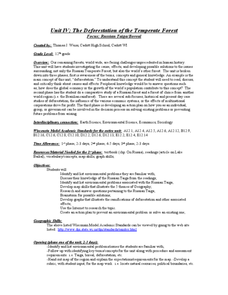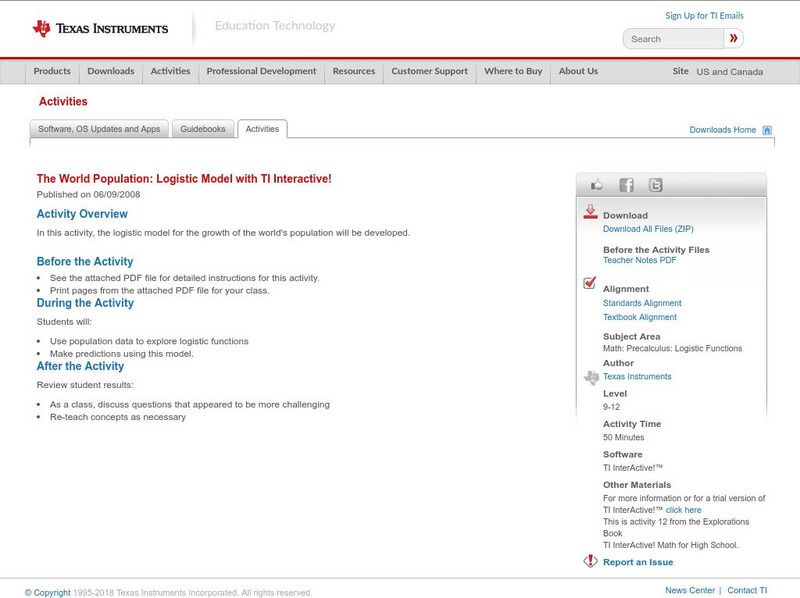Curated OER
Biological Sciences
Students examine biodiversity and interrelatedness concepts. In this ecology lesson students go on a field trip and fill out a data sheet.
Curated OER
The 99% Movement - Linking Math to Economics
Connecting mathematics with economics can be a liberating force for all involved.
Curated OER
Transportation Choices and the Environment
Pupils study statistics and charts pertaining to how transportation and other energy choices impact the environment. They participate in small group discussions regarding concerns for the future.
Curated OER
Gainging Perspective
Seventh graders examine and evaluate different perspectives of human and wolf interactions. They develop a conclusion based on research through the use of electronic resources.
Curated OER
The Cantankerous Pathogen
High schoolers explore what factors influence the spread of infectious diseases. They explain how human manipulation of the environment affects the transmission of diseases.
Curated OER
Biofilms Are Everywhere
Students research biofilms and create brochures. They role play as advertising firm members assigned to educate the general public about biofilms. They create "wanted dead or alive" posters about harmful and helpful biofilms respectively.
Curated OER
Discovering Your Community
Students focus on the origins of the families that make up their community by exploring their family's origins through themselves, parents, and grandparents. Students create a map marked with family origins for the class.
Curated OER
The Deforestation of the Temperate Forest Focus; Russian Taiga/Boreal
Twelfth graders complete a unit of lessons on the Russian Temperate Forest. They list the environmental problems associated with deforestation, conduct research, compare the Russian Taiga with other forests, create graphs, and develop an...
Curated OER
Acid and Rain and Its Effects
Young scholars work in groups for up to three weeks to investigate the possibility of acid rain in your area and to investigate the damage that acid rain can do to buildings, monuments, and plants. Each group prepares a report to local...
Curated OER
Rosie's Walk
Students use maps and globes to locate and describe locations, directions and scale. Using the maps, they identify man made or natural features of different environments. They practice using geographical terms to describe a specific...
Curated OER
Chewin' in the Chesapeake
High schoolers examine a web page on food webs and select a habitat to research. In this research lesson students identify the organisms found in the food web and present their findings to the class.
Curated OER
Protecting the Herd
Pupils simulate the spread of a fictitious disease using an internet-based simulation. In this biology instructional activity, students predict the factors that could affect epidemic. They investigate these prediction using computer...
Curated OER
World Bank Development Project Funding
Students prepare a developmental proposal to the World Bank for use in a developing nation. They explain the structure and role of the World Bank. They analyze the organization of development projects.
Curated OER
Where Is Hoku?
Young scholars are introduced to map making and reading. Using maps, they identify the cardinal directions and discuss the importance of a legend. They analyze the human characteristics of the classroom and create overhead view maps of...
Curated OER
America the Beautiful
Young scholars listen to a read-aloud discussing the landmarks of the United States. In pairs, they use the internet to research a landmark of their choice. They create a visual aid to be given with a presentation sharing the...
Texas Instruments
Texas Instruments: The World Population: Logistic Model
Students will collect world population data from the Internet, find a logistic model for the data, and use their model to predict future populations.
Geographypods
Geographypods: Theme 1: Population and Settlement
A rich collection of highly engaging learning modules on topics related to population and settlement. Covers six main areas - population growth, population change, population migration, land use, settlement characteristics and patterns,...
Illustrative Mathematics
Illustrative Mathematics: F Le in the Billions and Exponential Modeling
For this task, young scholars examine world population data from 1804 to 2012 and investigate whether an exponential function is appropriate for modeling the relationship between the world population and the year. Aligns with F-LE.A.1.c.
Other
Rockefeller University: Human Population Dynamics
Mathematically attempts to model human population growth in order to discuss whether the population will skyrocket or level off long before it doubles.
Texas Instruments
Texas Instruments: The World Population: Logistic Model With Ti Interactive!
In this activity, the logistic model for the growth of the world's population will be developed.
Texas Instruments
Texas Instruments: The World Population: Linear and Exponential Models
The population of the world has grown rapidly over the last century. In this activity, several models for the growth of the world's population will be developed. The validity of each in predicting past, current, and future populations...
Illustrative Mathematics
Illustrative Mathematics: F Le in the Billions and Linear Modeling
In this task, students are shown a table of world population data and asked to explore whether linear functions would be appropriate to model relationships within the data. Aligns with F-LE.A.1.b.
University of Saskatchewan (Canada)
University of Saskatchewan: Modelling Natural Growth
This site shows how to model exponential growth. The site walks the student through an example problem using logarithms to find the exponential growth of the theoretical world population.
























